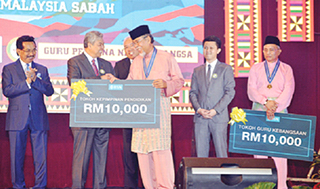Why the lack of tolerance: Zahid
Published on: Tuesday, May 17, 2016

Kota Kinabalu: The absence of cross-cultural communication is to blame for the low level of teachers and students' acceptance and tolerance of races, cultures and religions that are different from their own. Deputy Prime Minister Datuk Seri Ahmad Zahid Hamidi said a 2014 study conducted by the Ministry on unity index because the unity level was then at an all-time low, it was revealed that interaction and unity level between teachers and students was good."However, the same study showed that the ability of students and teachers to accept different races, cultures and religions was still very low. Why is that?
ADVERTISEMENT
"Because there is no cross-culture, cross-religion, cross-language communication. This is absent," he said, at the National-level Teachers' Day celebration, Monday. Zahid proposed that the current educational curriculum pay more attention to the importance of establishing cross-cultural relations so that real unity is established, not only within the four walls of a classroom but also outside.This culture, he said, must be shaped and taught since primary school and even better, in the preschools."In universities, I see incidents during orientation week, students segregate according to their race, language and culture.
ADVERTISEMENT
There is sadly no cross-cultural interaction and communication breaks down," he said.This is why, he said, a subject needs to be introduced at all school levels which teaches respect and tolerance of others' religion, race, language and culture.
ADVERTISEMENT
"We want other people to respect us but let them be with their religion and ours with our religion. We have to respect other religions, races and cultures so that they too would return that respect."Cross-culture, cross-language, this is what we want to emphasise and there is no other ministry that is more capable in instilling this value than the Ministry of Education and the teachers who are at the frontline," he said.He called on teachers to take up the challenge and set a new resolution in conjunction with this year's Teachers' Day and set out to do what is required of them because Teachers' Day itself is not just another event where its participants could be nostalgic about the good old days.Zahid reminded teachers that education does not discriminate against religion, race, language and culture and the nation's educational transformation programme requires the commitment of all teachers to implement fully its educational philosophy.Education, he said, should aim not only academic excellence, but also able to develop students who are competitive, resilient and strong-willed."Such characters must be developed from young and thus, would require stern commitment from you, the teachers, because not everybody can become teachers and leaders. Only those with the heart of a leader could become great teachers, like you ladies and gentlemen," he said.Zahid also called on parents, and more importantly, the society as a whole, to recognise and support teachers because nation-building should not only be confined to theories and shouted from the rooftops of schools.Without the backing of society, he said it would be very difficult to realise fully the nation's educational aspiration.It is easier to criticise but not so easy to implement, he said as teachers have the heavy responsibility of carrying out the duty to shape the society and the support of the society is very much needed to realise this ambition.He also called on the ministry to look after the welfare of teachers because simply praising them with sweet words every time Teachers' Day comes around does not do justice to their services and contributions."I am confident that the new education minister, since he has the right background, would do the best and look after our teachers, perhaps with better service schemes because we all know, they deserve it."If the economy improves, then of course we can also improve teachers' service scheme," he said.Zahid said the government will continue to improve the education quality in this country to a higher standard comparable with other developed countries.Currently, he said, literacy and numeracy proficiency of primary school students has reached 99 per cent while students' enrolment in primary schools had increased to 97.9 per cent in 2014 compared to only 95.7 per cent in 2010.Stay up-to-date by following Daily Express’s Telegram channel.
Daily Express Malaysia




